Heroes of Ruin Preview: Fantasy Stars Online
Streamlined dungeon-crawling for the 3DS.
"Heroes of Ruin" conjures up an image of the most traditional of role-playing games. It's the sort of name where you know it's an RPG without looking at a single screenshot, or moving your eyes any further down the box's cover. But the plural 'Heroes' is vital too.
The game's eponymous heroes inhabit a fantasy land that's no less traditional. It's a world inhabited by magicians, living weapons and leviathan sea monsters. The local ruler Atraxis (he's a sphinx) is sick with a mysterious illness and it is the task of four heroes to find out why.
So you become embroiled in the game's steady loop of missions and side quests, acted out within the game's dungeons and interspersed with visits to Nexus, the game's main city and hub. Nexus is Atraxis' seat of power and the source of the game's main story elements, fed to you through in-game scenes that offer information for the quest ahead.
Nexus is small but bustling, with numerous NPCs to interact with. The game offers voiced dialogue for important moments of the tale, but the vast majority of the game's story is doled in text form. Chat to an NPC and you'll either get an upper-class salutation ("Why hello there!") or an Albion-esque cheeky ("Oooh, 'ello!"), followed by a wall of text. There are multiple dialogue options to choose from, but beyond simply turning down someone's request for help these have little significance.
The hub city's design is compact but functional, and sums up the ethos of the entire game: Heroes of Ruin is meant as a multiplayer experience, and the less dilly-dallying the better. The game's dungeons and levels are the world's over-world; Nexus is there as a pit-stop, meant for stocking up and shipping out again as soon as possible.
It's a place to quickly track down a bargain and eye over the locals for side quests. Every visit will see a couple of NPCs highlighted on your map (the touch-screen), who will offer supplementary goals for your next location. These usually take the form of farming a specific enemy for a certain loot drop, or locating someone's lost friend or relative.
Alone, or with friends invited into your own Heroes of Ruin universe, you fast-travel to your next mission. Dungeons are enclosed, linear experiences with randomly generated maps designed to provide incentive for repeat visits. But the outcome of this is that levels frequently appear too similar, with tunnel after tunnel leading from dungeon entrance to end boss. The level map is uncovered as you travel, with enticing alternate routes quickly filled up by frustrating dead-ends.
Sometimes these cul-de-sacs offer up a treasure chest, designed to reward an extra few metres of exploration. Other times they house the subject of a side quest: a lost soul to be saved or a weary soldier needing aid. Otherwise it will just be a dead end, and you'll have to plod back to the main path.
Again, it's an instance where working in a team will help. There's no penalty for wandering off from your team-mates, leaving you free to swarm a dungeon and spread the chore of navigating every nook and cranny. Your fellow players can drop in, drop out or pause the game for a sip of tea without affecting their fellow adventurers, with the game scaling enemy strength to your party's size. You can also voice chat via local Wi-Fi or online, even with strangers (Nintendo, finally, thank you).
Experience Heroes of Ruin alone and it feels like you're only getting a quarter of the game. Not only are the game's four classes designed to mesh together in battle, but you'll be receiving the loot for all four classes, a third of which you won't be able to use. When first starting the game you'll choose between the sword-wielding Vindicator, the explosives and sidearm-toting Gunslinger, the sorcery-using Alchitect, or the Savage who likes to beat things to a pulp with his bare hands.
"Heroes of Ruin is a streamlined RPG dungeon-crawler, then, easy to pick up and delve into, but one that is designed to be experienced with others."
Thankfully the game has several clever systems for managing all the extra loot single players will encounter. Items applicable to your character are colour-coded to reflect their strength, relative to your current kit. Green, stronger items can be equipped by holding up on the d-pad. Those that are weaker or unusable by your class are red, but can be quickly sold by holding down on the d-pad. Selling items in Nexus will afford a greater profit but must be carried back there, filling limited inventory space. Sold loot will then become available for visiting players to buy, with items also available from people you StreetPass. Post-launch, Heroes of Ruin will use SpotPass, too, granting gamers extra daily challenges for at least a year.
The ease of item management is another example of the game's multiplayer focus. Items are limited to weapons, armour pieces, plus health and power regeneration potions. The latter of these are mapped to the d-pad's left and right buttons, making for an extremely simple set of control options. There are a few stats to contend with here and there: you'll get a screen of upgrade options every time you level up, for example, which houses basic skill trees for honing your skills towards improving either your Might (attack), Vigor (health) or Soul (powers).
Your basic attack is mapped to the B button, with up to three other active Powers (special attacks) which can be assigned to the other face buttons. Spam these and know when to dodge (the right shoulder button) and your enemies will soon fall in combat.
Heroes of Ruin is a streamlined RPG dungeon-crawler, then, easy to pick up and delve into, but one that is designed to be experienced with others. How easy to connect and how well populated the game's servers will be could be the key to the game's success, but something we're not likely to know until launch.
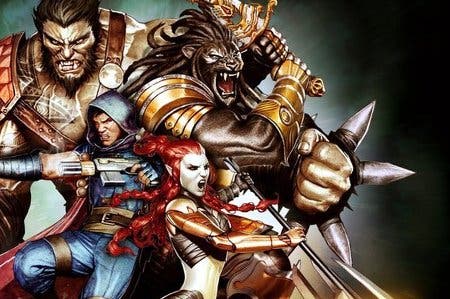

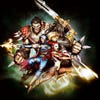
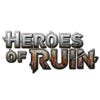
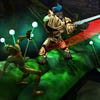
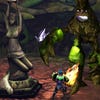
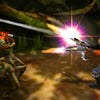
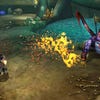
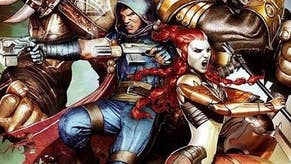

.png?width=291&height=164&fit=crop&quality=80&format=jpg&auto=webp)




.jpg?width=291&height=164&fit=crop&quality=80&format=jpg&auto=webp)
